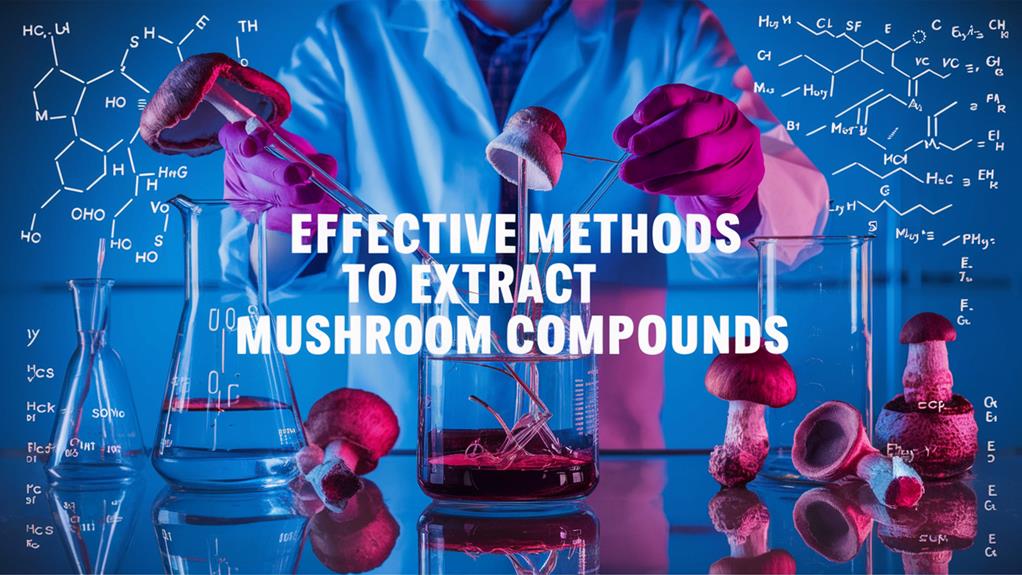
Effective methods to extract mushroom compounds include hot water extraction and alcohol extraction. For water-soluble compounds, simmering the mushrooms in water works well, similar to brewing tea. Alcohol extraction targets non-water-soluble compounds and involves soaking mushrooms for up to six weeks, with higher proof alcohol yielding better results. A powerful technique is dual extraction, which combines both methods for comprehensive benefits. This approach helps break down thick cell walls, improving absorption. The choice of extraction method directly affects the quality and concentration of beneficial compounds. You'll find even more insights as you explore further options and techniques.
What Is Mushroom Extraction?
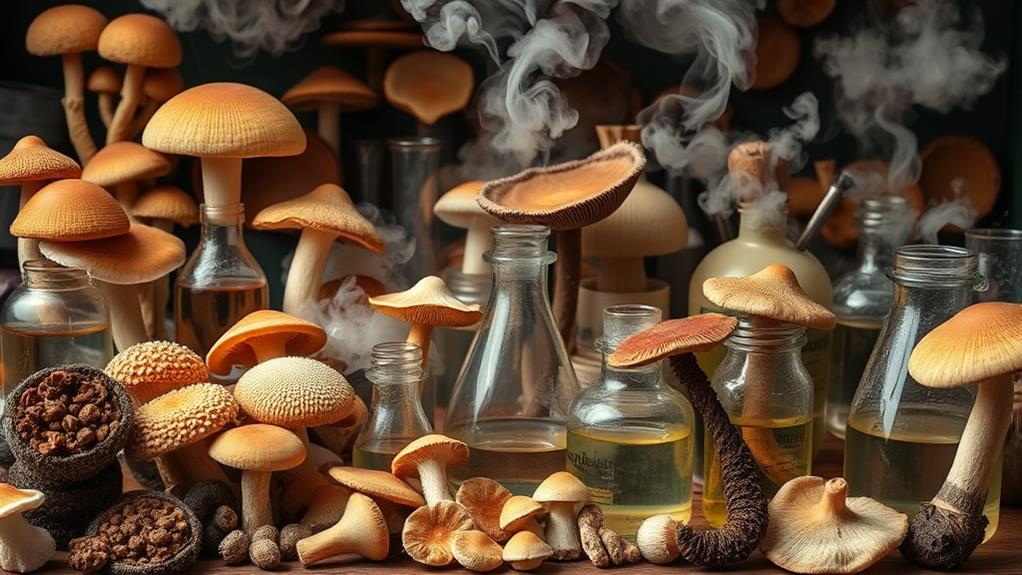
Mushroom extraction is all about separating valuable chemical compounds from mushrooms using solvents. This process helps you unlock a treasure trove of bioactive compounds, which are great for health and wellness.
First, you typically dry and grind the mushrooms. This increases the surface area, making it easier for solvents to penetrate and dissolve the beneficial compounds.
Hot water extraction is one common method, effectively targeting water-soluble compounds like beta-glucans. These compounds are known for their immune-boosting properties and are particularly beneficial for gut health.
On the other hand, alcohol extraction focuses on non-water-soluble compounds such as triterpenes, which offer a range of health benefits.
If you want the best of both worlds, you can use dual extraction. This combines both hot water and alcohol methods, allowing you to extract a full spectrum of compounds from the mushrooms.
The result of the mushroom extraction process is usually a mushroom-infused solvent. You can consume this in liquid form or turn it into powders for various uses.
Understanding these methods can help you appreciate how mushrooms can contribute to your health and well-being.
Importance of Extraction Methods
When you consider the importance of extraction methods, you're really looking at how well the beneficial compounds from mushrooms can be absorbed by your body.
Different methods play a crucial role in ensuring these compounds, like beta-glucans, are present in high concentrations and meet quality assurance standards.
Properly selecting a technique, such as hot water extraction, can significantly enhance the potency of the extracts.
Bioavailability of Compounds
Many people underestimate the importance of effective extraction methods in enhancing the bioavailability of mushroom compounds. The thick chitinous cell walls of mushrooms can inhibit the absorption of these beneficial compounds, making proper extraction essential. When you think of mushroom extraction, you should consider how techniques like water and alcohol can play a crucial role.
Hot water extraction isolates water-soluble compounds, such as beta-glucans, while alcohol extraction targets non-water-soluble compounds like triterpenes. This means you get a broader range of bioactive constituents when you use these methods. Additionally, understanding the specific properties of each mushroom can further guide the choice of extraction method, ensuring optimal results for health benefits.
Extraction methods are crucial for breaking down chitin in fungal cell walls, maximizing bioactive compound absorption.
Dual extraction combines both hot water and alcohol, maximizing the yield of both types of compounds. This comprehensive approach ensures that more active ingredients are available for your body to utilize.
Research shows that improper extraction techniques can lead to low levels of active compounds, which is why employing effective methods is vital. As extraction methodologies advance, they continue to improve the quality and efficacy of mushroom supplements, boosting the bioavailability of the compounds you need for optimal health.
Quality Assurance Standards
Ensuring quality assurance in mushroom extracts is crucial, as the methods used for extraction directly impact the concentration of beneficial compounds. When you choose mushroom extracts, it's important to know that true extracts typically contain higher levels of these compounds than the raw material.
High-Performance Liquid Chromatography (HPLC) plays a key role in measuring vital compounds like beta-glucans and triterpenes, ensuring the product's integrity and reliability of health claims.
Companies that certify their products as USDA Organic and maintain strict quality control demonstrate higher standards in extraction methods. This commitment leads to more dependable health benefits for you.
For mushrooms like Reishi and Chaga, dual extraction methods that combine hot water and alcohol are recommended. This approach fully unlocks both water-soluble and non-water-soluble compounds, enhancing the overall quality of the extract.
Moreover, ongoing research into extraction methodologies is essential. Not all extraction techniques yield the same levels of active compounds across different mushroom species.
Hot Water Extraction Process
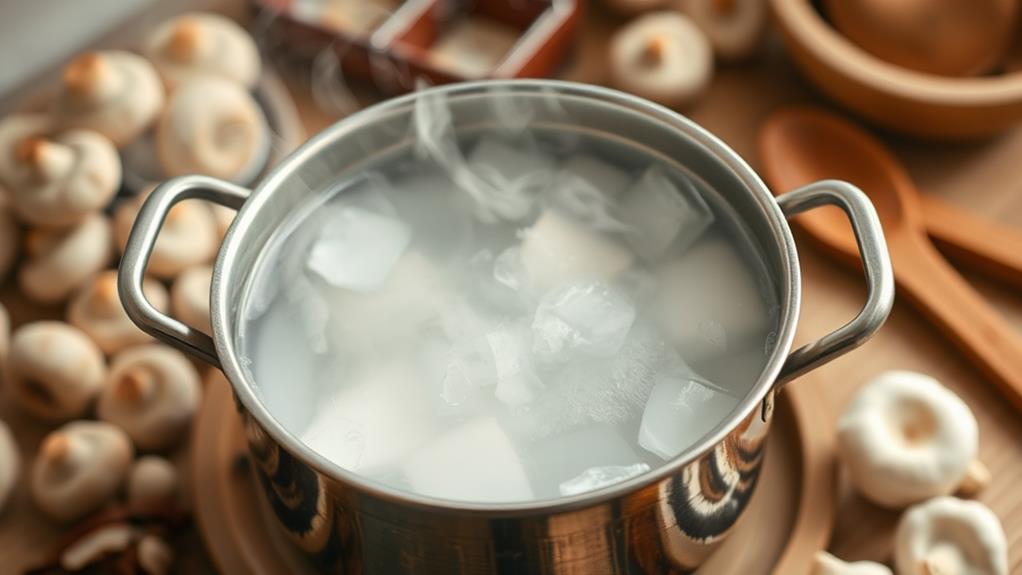
The hot water extraction process is a powerful technique for harnessing the health benefits of mushrooms. By simmering mushrooms in water for 30 minutes to several days, you effectively extract water-soluble compounds, particularly polysaccharides like beta-glucans. This method is similar to brewing tea; you grind the mushrooms, filter them, and concentrate the liquid to create an extract that can be consumed or dried into a powder.
Using hot water extraction helps you maximize the health benefits of medicinal mushrooms, as their thick chitinous cell walls make it difficult for your body to absorb active compounds without this process. The resulting extract retains beneficial bioactive compounds, making it a valuable addition to your wellness routine.
However, keep in mind that hot water extraction isn't effective for non-water-soluble compounds, meaning you won't be able to extract everything from the mushrooms using this method. Instead, focus on the water-soluble benefits, which are crucial for boosting your health.
Whether you're enjoying a liquid extract or a powdered form, the hot water extraction process is essential for unlocking the potential of medicinal mushrooms.
Alcohol Extraction Techniques
When you're using alcohol extraction techniques, the soaking duration can really change your results. A longer soak, anywhere from 1 to 6 weeks, often leads to better extraction of important compounds, but you should also consider the concentration of your alcohol.
To boost efficiency, remember to stir the mixture regularly, which helps the alcohol pull out those beneficial properties from the mushrooms.
Soaking Duration Variations
Soaking mushrooms in alcohol is a crucial step for extracting their beneficial compounds, and the duration of this process can significantly impact the quality of the final extract. Generally, alcohol extraction techniques involve soaking mushrooms in food-grade alcohol for anywhere from 1 to 6 weeks. During this time, you'll allow the alcohol to draw out alcohol-soluble compounds in mushrooms, such as terpenoids and phenolics.
If you soak for less than 1 week, you mightn't extract enough compounds, while soaking for over 6 weeks usually won't boost the yield much and could even affect quality. It's essential to stir the mixture periodically, especially during longer soaking durations, to enhance the extraction efficiency.
The alcohol percentage you choose also plays a vital role; higher proof alcohol, like 190 proof Everclear, is often recommended since it effectively dissolves various compounds.
Keep an eye on your soaking process, adjusting the time based on the specific mushroom species you're using. This close monitoring will help you achieve the desired concentration of beneficial compounds in your final extract, ensuring you maximize the effectiveness of your extraction processes.
Solvent Concentration Impact
Choosing the right alcohol concentration significantly affects the extraction process and the quality of the final product. In alcohol extraction, you'll typically use food-grade alcohol with concentrations ranging from 15% to 95%. The solvent concentration plays a vital role in determining which compounds you'll extract from mushrooms.
Higher alcohol concentrations, like 190 proof, are particularly effective for pulling out non-water-soluble compounds, such as terpenoids and phenolics. These compounds are essential for the health benefits associated with medicinal mushrooms like Reishi and Chaga.
To maximize extraction efficiency, you might consider soaking the mushrooms for an extended period, anywhere from 1 to 6 weeks. This duration allows the alcohol to thoroughly interact with the mushroom material, yielding a more comprehensive profile of active compounds.
Additionally, combining your alcohol extract with a hot water extract creates dual extracts. This method captures both water-soluble and non-water-soluble compounds, ensuring you get the most out of your mushrooms.
Stirring for Efficiency
To enhance the efficiency of compound extraction during alcohol extraction, incorporating regular stirring is crucial. When you stir the mixture, you promote better interaction between the alcohol and the mushroom material, leading to a more effective extraction of valuable compounds.
Ideally, you should soak the mushrooms in food-grade alcohol for 1 to 6 weeks. Regular stirring during this time helps dissolve alcohol-soluble compounds like terpenoids and phenolics.
Efficient stirring ensures that all active compounds are evenly exposed to the alcohol, maximizing the yield of beneficial constituents. If you neglect this step, sedimentation can occur, causing some mushroom particles to settle and remain unextracted. By keeping everything suspended, you create an environment for thorough extraction.
Additionally, incorporating stirring not only shortens the extraction time but also enhances the overall potency of your final tincture product.
So, as you embark on your extraction journey, remember that consistent stirring is key to unlocking the full potential of the mushroom's compounds. By doing this, you'll ensure that your tincture is both effective and beneficial.
Happy extracting!
Dual Extraction Overview
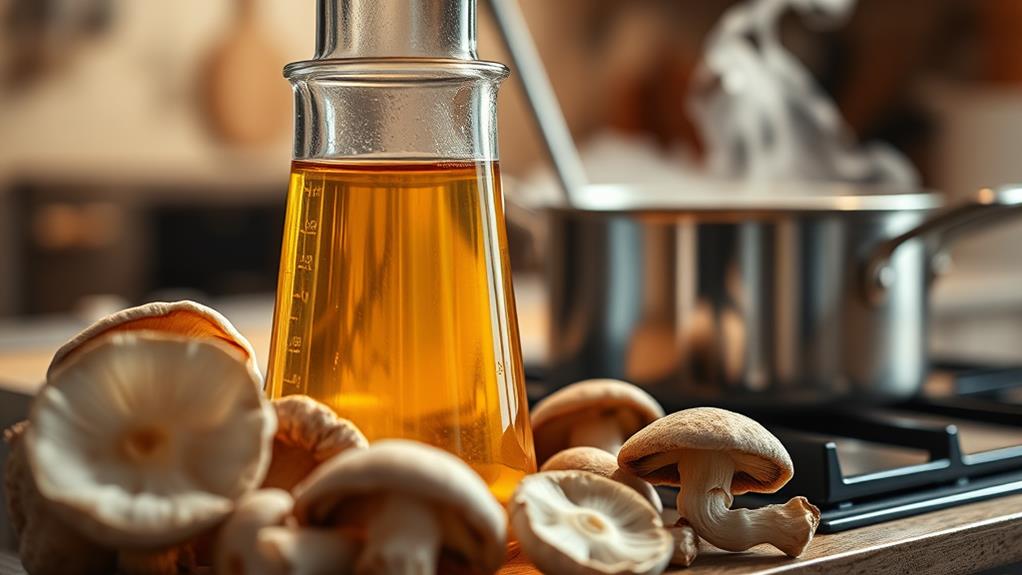
While exploring effective methods for extracting beneficial compounds from mushrooms, dual extraction stands out as a powerful technique. This method combines hot water and alcohol extraction to yield a comprehensive profile of both water-soluble and non-water-soluble medicinal compounds from mushrooms.
You typically start with a hot water extraction, which breaks down certain compounds before soaking the resulting mushroom powder in a mixture of water and alcohol.
The dual extraction process usually takes about 3 to 7 weeks. This extended time allows the alcohol to extract triterpenes and other non-water-soluble compounds that hot water alone can't capture. It's especially beneficial for mushrooms like Reishi and Chaga, known for their rich profiles of therapeutic properties.
However, it's important to manage the process carefully. If mishandled, you could end up with the precipitation of polysaccharides, which might affect the quality of your final tincture.
Non-Water-Soluble Compounds
Non-water-soluble compounds in mushrooms play a vital role in their medicinal properties, yet they often require specific extraction methods to be effectively isolated.
These compounds, such as triterpenes and phenolics, aren't extracted through hot water methods alone. For instance, triterpenes like ganoderic acids found in reishi mushrooms need alcohol extraction since they dissolve in alcohol rather than water.
When dealing with mushrooms like chaga, you'll find that specific non-water-soluble compounds, including inotodiol and betulinic acid, are best extracted using dual extraction methods. This approach combines both water and alcohol to maximize the extraction of beneficial properties.
However, it's important to note that not all mushrooms contain significant amounts of these compounds. For example, lion's mane and turkey tail mainly yield water-soluble benefits, making dual extraction unnecessary for those varieties.
Extraction takes careful research and optimization to ensure that you retain the medicinal benefits of these compounds while avoiding degradation during the process.
Measuring Extract Quality
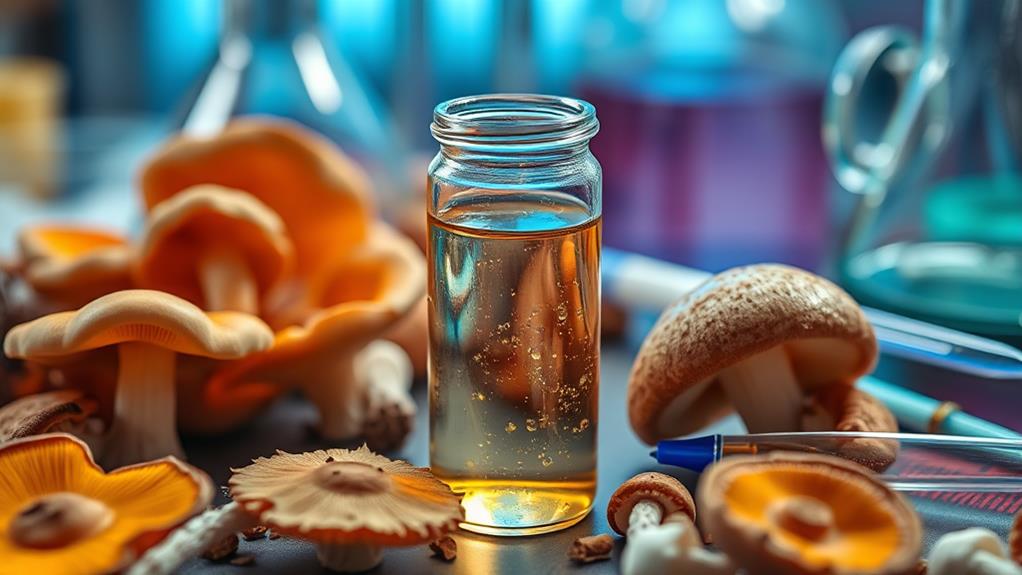
Regularly measuring extract quality is crucial for ensuring the effectiveness of mushroom supplements. To achieve this, you need to analyze both water-soluble and non-water-soluble compounds. High-Performance Liquid Chromatography (HPLC) is a popular method for accurately quantifying non-water-soluble compounds like triterpenes in your mushroom extraction. This technique helps you verify the presence of active constituents, ensuring that what you're consuming is effective.
Another key parameter for quality assurance is the concentration of beta-glucans, a vital water-soluble compound. Many reputable brands guarantee levels above 35%, so checking these numbers is essential. Moreover, terms like "dual extract" can be misleading without scientific analysis to back them up, which is why measuring extract quality is so important.
Ongoing research into extraction methods enhances our ability to measure bioactive compounds effectively. Since the effectiveness of extraction methods can vary, continuous analysis is needed to confirm the potency and integrity of your mushroom extracts.
Benefits of Mushroom Extracts
Mushroom extracts offer a wealth of health benefits that go far beyond their appealing flavors. These extracts are packed with antioxidants, which support your immune health and help combat oxidative stress. The bioactive compounds include beta-glucans, known for their immune-modulating properties that contribute to overall wellness.
Certain mushrooms, like Turkey Tail and Lion's Mane, have been researched for their potential cognitive-enhancing effects and anti-inflammatory benefits. This means they might help improve your memory and reduce inflammation in your body.
Furthermore, studies indicate that mushroom extracts can enhance gut health and digestive function due to their polysaccharide content.
The traditional medicinal uses of mushrooms have been validated by modern research, showing their role in enhancing health and preventing chronic diseases. By incorporating mushroom extraction into your diet, you're tapping into a natural source of support for your body.
Whether you're looking to boost your immune system or improve cognitive function, these extracts provide numerous benefits. So, consider adding mushroom extracts to your wellness routine and experience the positive effects they can bring to your health!
Risks and Considerations
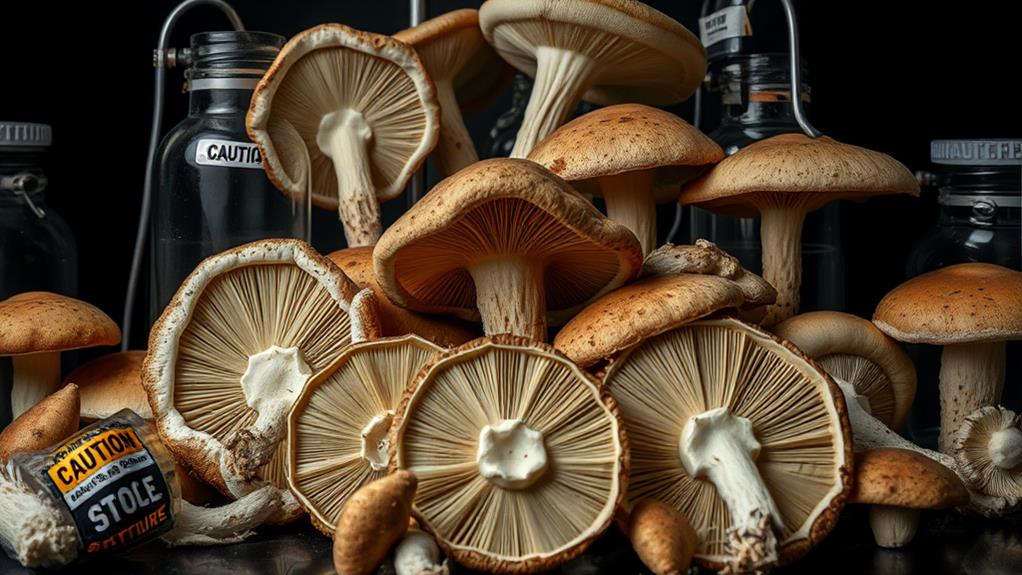
While exploring the benefits of mushroom extracts can be exciting, it's essential to recognize the potential risks and considerations associated with their use. One major concern is the quality and potency of the extracts, which can vary significantly between brands. When selecting products, you should prioritize those that use reliable mushroom extraction methods, like heat-based techniques, as these ensure better quality and therapeutic effectiveness.
Not all mushrooms are safe for consumption, and some can even be toxic. Before trying any new extract, consider the raw materials used and check for any potential interactions with medications you might be taking. Possible side effects include digestive upset and allergic reactions, highlighting the importance of individual tolerance and sensitivity to mushroom extracts.
Moreover, ongoing research indicates that more studies are needed to establish conclusive benefits of various mushroom extracts. This uncertainty underscores the necessity for caution when interpreting health claims.
Conclusion
In conclusion, extracting mushroom compounds is a fascinating journey, much like uncovering hidden treasures in a forest. By understanding various methods, from hot water to alcohol and dual extraction, you can tap into the full potential of these fungi. Remember, quality matters, so always measure your extracts carefully. While the benefits are plentiful, it's crucial to be aware of risks involved. With the right approach, you can enjoy the rich rewards that mushroom extracts have to offer.
